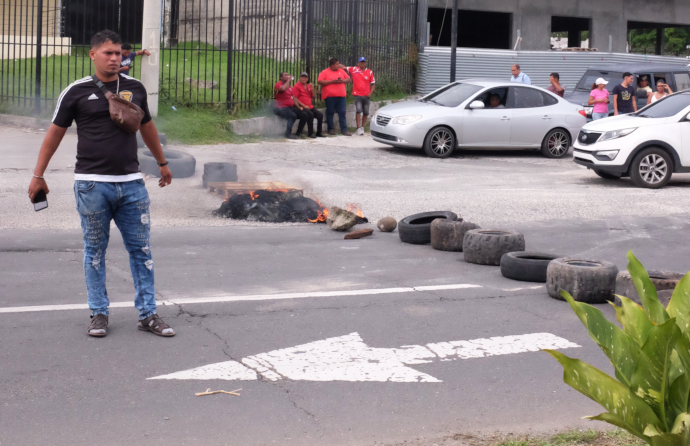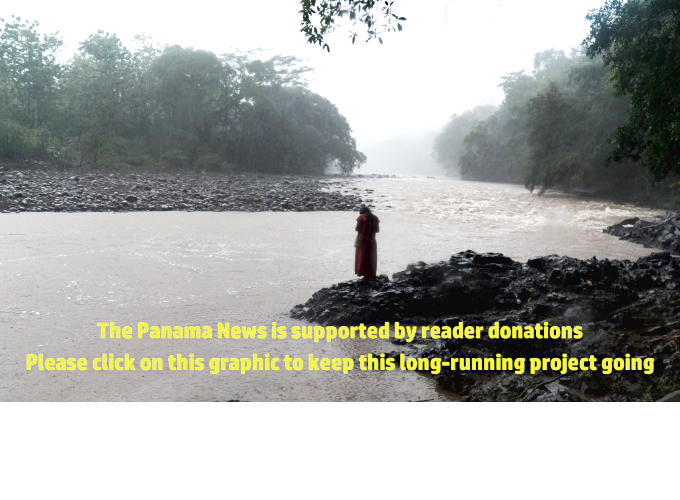A roadblock during the strike at Anton. It was unacknowledged – self-respecting cops don’t want look like they’re making corrupt deals with offenders and true revolutionaries don’t want to be accused of revisionist sellouts – but a certain amount of cooperation and negotiation wasn’t hard to spot. Tacit deals were apparently made to prevent violence between police and protesters and those apparently also extended to understandings between the protesters and the bus drivers. Photo by Eric Jackson.
How it works in practice
by Eric Jackson
Yeah, yeah. We heard it so often during the strike, especially from those foreign expatriates who want everyone to know that the came here not so long ago and HAVE PROPERTY here, and moreover have made the acquaintance of some Panamanians FROM THE BETTER FAMILIES. Not that they ever studied law, much less the comparative law across different families of legal systems, but they wanted everyone in the gringo community that IT IS WRITTEN, right there in the Panamanian constitution, that:
ARTICLE 27. Every person may move freely through the national territory and change address or residence without further limitations than those imposed by the laws or regulations of transit, taxation, health and migration.
Now, those of us who have lived here a bit longer, especially in the Metro area, will understand the idealistic, aspirational aspect of this sweeping statement of law. “Move freely?” Coming into Panama City over the bridges on a workday morning? Navigating around the capital’s traffic jams?
It’s a stated ideal, not especially a limit on anybody in particular’s powers, with some exceptions noted but far from all of them and leaving out some very important aspects of our national culture. When Panamanians are pushed to a certain level of annoyance by the government, they go on strike by blocking the roads. Leave it to authorities to understand – or misunderstand – the natures of provocation and annoyance, both of those blocking the road and drivers caught in traffic jams because of that.
Orders come down from the president, the public safety minister and the national police chief, which the officer on the beat is bound to obey. But it’s not Hollywood stuff, where the cop yells “FREEZE!” and if the citizen (or clueless foreigner who doesn’t understand the language) doesn’t immediately obey a hail of hot lead ensues. What we mostly saw during the recently concluded strike was police trying to keep the peace much more than trying to punish designated bad guys.
For a militant strike that paralyzed the country, strikers and law enforcement by and large both showed great restraint. The company and politicians, who defiance of an earlier court order and whose in-everybody’s-face crude abuses enraged public opinion? They carried on as usual and continue to do so notwithstanding the scolding that they got from the Supreme Court in its ruling that set the stage for the strike to end. Why would they think of that? It’s downright unconstitutional!
ARTICLE 19. There will be no immunities or privileges or discrimination due to race, birth, disability, social class, sex, religion or political ideas.
WHAT? This is PANAMA, where family background, plus wealth and social class, mean a great deal in everyday life, and where we constantly hear leaders of the snottiest organizations talk about what needs to be done to those with political ideas opposed to their own, especially but not only to communists.
But again, the 1972 constitution that we have inherited from the dictatorship is by its very title “The Political Constitution of The Republic of Panama” – leaving all this wiggle room for snobbery outside of the public sphere – and again, it’s an idealistic, aspirational document.
To illustrate the difference with US constitutional law, let’s compare what the two documents say about freedom of expression and the right to assemble. In the USA:
First Amendment: Congress shall make no law respecting an establishment of religion, or prohibiting the free exercise thereof; or abridging the freedom of speech, or of the press; or the right of the people peaceably to assemble, and to petition the Government for a redress of grievances.
Whereas – setting aside different notions about religion here – in Panama the constitution goes like this:
ARTICLE 37. Every person can freely express their thoughts by words, in writing or by any other means, without being subject to prior censorship; but there are legal responsibilities when by any of these means the reputation or honor of people, social safety or public order are attacked.
ARTICLE 38. The inhabitants of the Republic have the right to assemble peacefully and without weapons for lawful purposes.
Demonstrations or outdoor meetings are not subject to a permit and only prior notice to the local administrative authority, twenty-four hours in advance, is required to carry them out.
The authorities may take police measures to prevent or suppress abuses in the exercise of this right, when the way in which it is exercised causes or may cause disruption of traffic, alteration of public order or violation of the rights of third parties.
SEE! The company boosters in the expat enclaves might say: Panama’s constitution DOES allow the authorities to move in against people blocking the road! And if they look deeper into statutory law, they can find statutes that are violated when roads are blocked.
Aspirational in nature, though. The authorities “may….” Nothing mandatory about how when the mayor leads a mob throwing rocks to drive off the protesters, the cops have to intervene on the mayor’s side. Nothing about how, when a Panamanian organized crime lawyer whose family is married into the vice president’s family guns down protesters, police are obliged to take the gunman’s side.
And the gringos? The First Amendment says “Congress shall make no law….” But if the great and sovereign State of Mississippi passes a law that says that black people should shut up and take whatever degradation we have coming to them? Well, see, in the early 1860s there was a civil war about that, after which a number of constitutional amendments were imposed by the victors. Two of these, the Fourteenth and Fifteenth Amendment, combined with precedential high court decisions about what they mean, essentially extend the First Amendment ban on what Congress might do to the states and their subdivisions.
Up there, precedent matters as to what the substantive law means. Down here, they keep just spotty records of what the courts decide, treat every case and every party as different, but also flesh out the meaning of our written laws by reference to, among other things, the customs of this country and of legal systems to which Panama’s is related.
The 20th will be a national day of mourning to remember the hundreds of Panamanians, mostly noncombatant civilians, who were slain in the 1989 US invasion. There is the national law, but in most locales it will be implemented via mayoral decrees. No liquor sales. No loud music. No dancing. And if you want to get into the customary law of that, go back to ancient Rome, whose legal system is an ancestor of Panama’s. That’s what a day of mourning means in the Civil Code legal system, something that has no precise equivalent in the Anglo-American Common Law legal system.
Is there a moral to the story? Yes, several. But for now let’s leave it with the notion that there is a difference between transliteration – and the arrangement of a series of dictionary meanings of words – and translation, which is a rendering of expressions from one culture to another, a much more painstaking task.
In either case, no matter what either system’s advocates tell you about equality before the law, you need to understand power relationships to understand how the law gets applied.
What may confuse, outrage or frighten many about what just happened here is that an enraged public has intervened to override the pretensions of those who hold the formal strings of authority.
So is it “mob rule?” Is it “terrorism?”
Consider that part of Panama’s constitution that the radicals say that they might have taken recourse:
ARTICLE 310. …All Panamanians are obliged to take up arms to defend the national independence and the territorial integrity of the State. …
Read that whole article and see how that excerpt can reasonably be called out of context. But pay attention to the January 9th Day of The Martyrs observances, on another national day of mourning, know who did what or reputedly did so, and begin to understand a Panamanian customary attitude about ordinary citizens rising up in defense of Panama.
Know this as well about the stated foundation of the Panamanian legal system:
Article 2. Public Power emanates only from the people. …
Contact us by email at fund4thepanamanews@gmail.com
To fend off hackers, organized trolls and other online vandalism, our website comments feature is switched off. Instead, come to our Facebook page to join in the discussion.
These links are interactive — click on the boxes












